Prayer for the Living Read online
Also by Ben Okri
FICTION
Flowers and Shadows
The Landscapes Within
Incidents at the Shrine
Stars of the New Curfew
The Famished Road
Songs of Enchantment
Astonishing the Gods
Dangerous Love
Infinite Riches
In Arcadia
Starbook
The Comic Destiny (previously Tales of Freedom)
The Age of Magic
The Magic Lamp
The Freedom Artist
ESSAYS
Birds of Heaven
A Way of Being Free
The Mystery Feast
A Time for New Dreams
POETRY
An African Elegy
Mental Fight
Wild
Rise Like Lions (Anthology)
PLAYS
The Outsider
PRAYER FOR THE LIVING
Stories
Ben Okri
www.headofzeus.com
First published in the UK in 2019 by Head of Zeus Ltd
Copyright © Ben Okri, 2019
The moral right of Ben Okri to be identified as the author of this work has been asserted in accordance with the Copyright, Designs and Patents Act of 1988.
All rights reserved. No part of this publication may be reproduced, stored in a retrieval system, or transmitted in any form or by any means, electronic, mechanical, photocopying, recording, or otherwise, without the prior permission of both the copyright owner and the above publisher of this book.
This is a work of fiction. All characters, organizations, and events portrayed in this novel are either products of the author’s imagination or are used fictitiously.
A catalogue record for this book is available from the British Library.
ISBN (HB): 9781789544596
ISBN (XTPB): 9781789544602
ISBN (E): 9781789544589
Cover design: studiohelen.co.uk
CPI Group (UK) Ltd, Croydon CR0 4YY
Head of Zeus Ltd
First Floor East
5–8 Hardwick Street
London EC1R 4RG
WWW.HEADOFZEUS.COM
To Maggie McKernan
For the care
And the years
Read Slowly
Contents
Welcome Page
Copyright
Dedication
Boko Haram (1)
Prayer for the Living
An Inca Elegy
A Sinister Perfection
Ancient Ties of Karma
Dreaming of Byzantium
The Canopy
In the Ghetto
Hail
Mysteries
Tulips
The Lie
Boko Haram (2)
The Master’s Mirror
The Standeruppers
Alternative Realities Are True
The Story in the Next Room
The Overtaker
Raft
The Secret History of a Door
The Offering
Don Ki-Otah and the Ambiguity of Reading
Boko Haram (3)
A Street
Acknowledgements
About the Author
An Invitation from the Publisher
‘It is vain to do with more what can be done with less.’
WILLIAM OF OCCAM
Boko Haram (1)
They strapped the bomb round his chest and buttoned up his shirt. His father was with them. When the boy looked up at him, his father smiled. Together they recited the words of the prophet.
The father stood there and watched as they led the boy away. He prayed that the boy would be brave and would do what he had been told. He knew the rewards in paradise were great. He could see the rewards already.
At the marketplace they let the boy go. He wandered a few steps and looked back. They stared at him brightly. Then he walked unsteadily past the fish sellers and the cloth merchants and the women who sold provisions on a cloth on the floor. Some of them knew him and called out to him. But he went on walking. He looked steadily ahead. Sweat formed in beads on his forehead.
He went to the centre of the marketplace, where it was busiest. As he walked he recited the words they had taught him. They were not words from the Koran. They were words given him by the men from the sect. He recited the words in the heat and noise of the market. Then he stood in the centre and waited.
He did not know what he was waiting for. They had only told him that when he was in the centre of the marketplace he was to wait. He was not to look at anyone. He was not to speak to anyone. He was only to recite under his breath the words he had been given.
He did not know about the scattered fragments of limbs and the ripped earth as the bomb tore up the marketplace. He did not know about it because he was still saying the words he had been given when it exploded.
Prayer for the Living
We entered the town at sunset. We went from house to house. Most of the roofs were shattered, the walls blown apart. Everything was run-down and deserted. The town quivered with death. The world was at the perfection of chaos. Gunrunners lived off the desolation. It was as expected.
The little godfathers who were in control raided the food brought for us. They sabotaged the airlifts and the relief aid. They shared the food among themselves and members of their clan.
We no longer cared. I had gone without food for three weeks.
I feed on the air and on my quest. Every day, as I grow thinner, I see more things about me. I see the dead. I see those who have died of starvation. The dead are happier than we are, living their luminous lives as if nothing has happened. They are more alive than us. They are everywhere.
The hungrier I become, the more I see them. I see my old friends who have died before me, among a chorus of flies. They feed on the light of the air.
They look at us, who are living, with pity and compassion. I suppose this is what the white ones cannot understand when they come with their television cameras and their aid.
They expect to see us weeping. Instead they see us staring at them with a bulging placidity in our eyes. We do not beg. Maybe they are secretly horrified that we are not afraid of dying this way.
But after three weeks of hunger the mind no longer notices. One is more dead than alive. It is the soul wanting to leave that suffers. It suffers because of the body’s tenacity.
2
We should have come into the town at dawn.
In the town everyone had died. The horses and the cows and the goats too. I could say that the air stank of death, but that wouldn’t be true. It stank of rancid butter and poisoned heat and raw sewage and flowers.
The only people who weren’t dead were the dead. They were joyful and they sang lovely songs in low enchanted voices. They carried on their familiar lives.
The soldiers fought eternally. It didn’t matter to them how many died. All that mattered was how they managed the grim mathematics of war. All they cared about was winning the most important battle of all, control of this fabulous graveyard, this once beautiful and civilised land.
3
I was searching for my family and for my lover. I wanted to know if they were dead or not. If I didn’t find out, I intended to hang on to life by its last thread. If I knew that they were dead and no longer needed me, then I would die in peace. All the news led me to this town.
If they are anywhere they are here. This is the last town in the world.
Beyond its broken gate lies the desert.
The desert stretches all the way into the past. It stretches into history, into the western worlds. It extends to the source of drought and famine, to the
mountains of lovelessness. From its peaks, at night, the grim spirits of negation chant soul-destroying songs. Their songs steal hope from us and make us yield to the air our powers. Their songs are cool as mountain-rain and make us submit to the clarity of dying.
Before all this came to be there were all the possibilities in the world. There were opportunities for starting from small things. There were all the chances to create a new history and a new future, if only we had seen them. If only we had taken them.
But now only the songs of negation lie ahead.
4
We search for our loved ones mechanically. We search with a dryness in our eyes. Our bellies no longer exist. Nothing exists except the search.
We turn the corpses over, looking for familiar faces. All the faces are familiar. Death has made them all my kin.
5
I search on.
I come across an unfamiliar face. It is my brother.
I nod.
I pour dust on his flesh.
Hours later, near a dry well, I come upon the other members of my family.
My mother holds on tightly to a bone so dry that it wouldn’t even nourish the flies.
I nod twice.
I pour dust on their bodies.
6
I search on.
There is one more face whose beautiful unfamiliarity will console me. When I have found that face then I will submit to the songs of negation.
7
Night was approaching when I heard a different singing. It came from an unfinished school building. It was the most magical sound I had ever heard. I thought only those who know how sweet life is can sing like that, can sing as if breathing were a prayer.
The singing was like the joyous beginning of all creation. It was a holy yes to the light in all things, the light that makes the water shimmer, that makes the plants sprout, that makes men and women gaze in wonder at the radiance of colour, the emerald of the sea, the silver of the stars.
It was the true end of my quest, the music to crown this treacherous life of mine. It was the end I couldn’t have hoped for or imagined.
8
It took an infinity of time to get to the school building. I had no strength left. It was only the song’s last echo, resounding through the spaces of my hunger, that sustained me.
After a vast cycle of time, during which history repeated itself and brought about the same results, because we never learn our lesson, never love enough to learn from our pain. After maybe a century, I finally made it to the door of the school.
But a cow, the only living thing I saw in the town, went in through the door before me. It too must have been drawn by the singing.
The cow went into the room, and I followed.
9
Inside, all the space was taken up with the dead.
But the air didn’t have death in it. The air had prayer in it. The prayers stank more than the deaths.
The dead here were differently dead from the corpses outside.
10
The dead in the school were, forgive the paradox, alive. I have no other word to explain their serenity. They had made the room holy. In their last moments, they had thought not of themselves, but of all people who suffer.
I did the same thing. I crawled to a corner, leant against the rough clay wall, and found myself praying for the whole human race.
I knew that prayers are possibly a waste of time. But I prayed for everything that lives, for mountains and trees, for animals and streams, and for human beings, wherever they might be.
I heard the anguished cry of all mankind, its haunting music as well.
11
Without moving my mouth, for I had no energy left, I began to sing. I sang in silence. I sang all through the night and I sang into the dawn. When I looked at the body next to me and found the angular unfamiliarity of its face to be that of my lover, I sang all through the recognition.
I sang even when a white man with a television camera came into the school building. I sang while, weeping, he filmed the roomful of the dead for the world to see. I hoped he recorded my singing too.
12
The dead were all about me. They were serene.
They didn’t urge me on. They were just quietly joyful. They didn’t ask me to join them. They left it to me.
What would I choose? Human life, full of greed and war and selfishness. Human life, low in awareness, dim in its light, judgemental, unforgiving, uncaring. Human life, gentle, sometimes wonderful, sometimes kind. But human life had betrayed me.
Besides, there was nothing left in me to save. Even my soul was dying of starvation.
13
I opened my eyes for the last time. The cameras were on us. To them, we were the dead.
14
As I passed through the agony of the light, I saw them as the dead. They were marooned in a world without pity, without love.
15
The cow wandered about in the apparent desolation of the room. It must have seemed odd to the people recording it all that I should have made myself so comfortable there.
I did.
I made myself comfortable.
16
I stretched out my hand and took the hand of my lover. Her hand was cold and dry. With a painful breath and a gasp and a smile, I let myself go.
The smile must have puzzled the journalist.
If he had understood my language, he might have known it was my way of saying goodbye.
An Inca Elegy
I had taken a group up into the mountains to where the last of the Incas lived. The Inca women up there in the forest are the most beautiful you are ever going to see. I had just come out of the army then. The army was good for me. But for a while it made me a brute.
As I was taking this group of Americans through the village I came upon an adobe house. It was the only one I had permission to take the tourists through. I knocked and went in. They speak Quechua up there. I had learned Quechua in the army. I showed the tourists how the last of the Incas live. It was a room just like this one here in Machu Picchu. In one corner they have their vegetables, in another their traditional stove. High up they have their dried fruits and their hay. Even their rooms are terraced. I was amazed at how much they could fit into those small rooms. They had everything they needed in there.
As I was showing the tourists around I noticed this Inca woman in a corner. The adobe house belonged to her. She stood there, peeling a dried fruit. There was a terrible sadness on her face. For some reason it pierced deep into my heart. Like I said, I speak Quechua.
‘Does our presence upset you?’ I said to her.
‘No.’
But she still had the sadness.
‘If we have offended in any way, I wish to apologise now. We have no desire to offend you at all.’
‘You have not offended me.’
‘Have any of these tourists offended you?’
‘No.’
‘Because if they have, I will speak to them immediately and they will apologise.’
‘They have not offended me.’
‘Maybe our being here in your private space is an offence, for which I sincerely apologise.’
‘It is not an offence and there is no need to apologise.’
The immeasurable sadness was still in her eyes. I could feel it and it cut me to my soul. I could not continue the tour. She stood there in a corner and the sadness was like the weight of centuries. I kept puzzling in my mind what might have caused it. The thought would not let me rest.
‘What is it that troubles you? Are you sick? If you are sick, tell me. I have all kinds of medicines with me. You can have them all.’
‘I am not sick.’
‘Is it money you need? I don’t have much, but you can have all that is with me.’
‘It is not money.’
‘Maybe it is family. Anything I can do to help, just ask me.’
‘Thank you. It is not family.’
I was still wracking my brains. I
began to pace the room. Then she looked at me and all the poignancy of her sadness shot from her eyes into the foundations of my being. It rocked my heart, I don’t know why.
She hadn’t said a word. Then, as if overcoming a great struggle, she said:
‘The reason I am so sad is that I will never have children.’
‘Why not?’ I said. ‘Of course you can. Look at you, you are beautiful and young.’ She weighed me down with her eyes.
‘Have you noticed anything about the village?’
I came out with many things I noticed, but she kept shaking her head.
‘There are no men,’ she said.
I hadn’t considered it but I had noticed it. It was true. There were no men in the village.
‘Where are they?’
‘They go to the cities for work. They never come back.’
I had heard about this. I did not know why this prevented her having children.
‘Don’t worry. I am a man,’ I said passionately. ‘I can marry you. I will marry you now. We can have children.’
She gave me a long look. It was disquieting. As she looked at me I felt myself fading till I was almost a shadow. I don’t know how that happened. Before, being in the army, I had a strong sense of myself and my presence. I knew who I was. But under her gaze I immediately felt my identity dissolve. I have no idea why.
‘What is your name?’ she asked.
I told her my three names. She repeated my last in an undertone, with a little smile.
‘From your last name I can tell you have Spanish blood.’
It was true. I have a small amount of Spanish blood, from my great-grandfather.

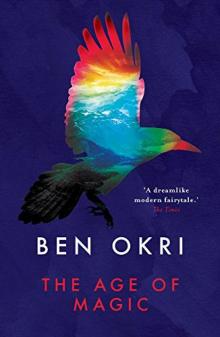 The Age of Magic
The Age of Magic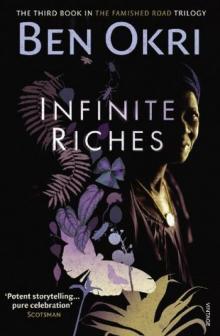 Infinite Riches
Infinite Riches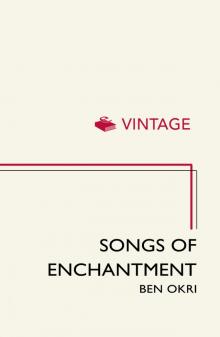 Songs of Enchantment
Songs of Enchantment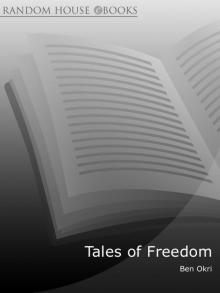 Tales of Freedom
Tales of Freedom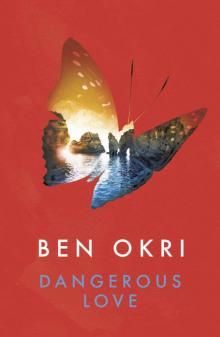 Dangerous Love
Dangerous Love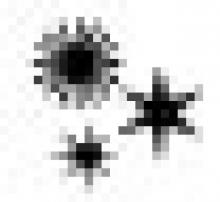 Starbook
Starbook The Famished Road
The Famished Road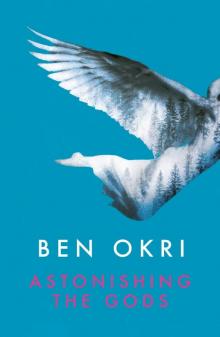 Astonishing the Gods
Astonishing the Gods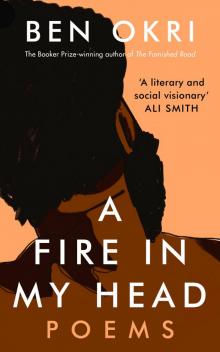 A Fire in My Head
A Fire in My Head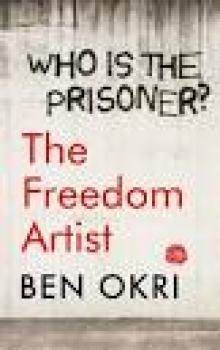 The Freedom Artist
The Freedom Artist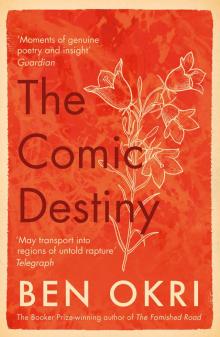 The Comic Destiny
The Comic Destiny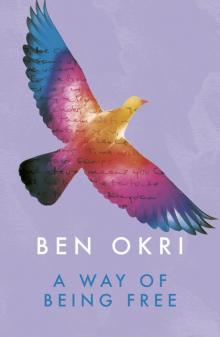 A Way of Being Free
A Way of Being Free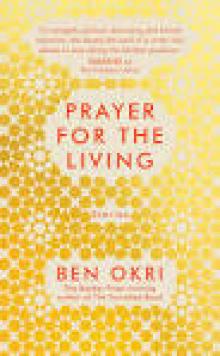 Prayer for the Living
Prayer for the Living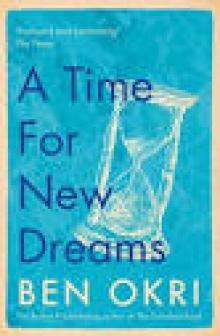 A Time for New Dreams
A Time for New Dreams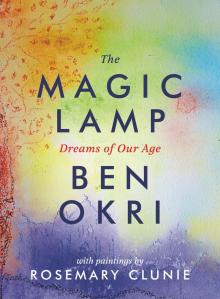 The Magic Lamp
The Magic Lamp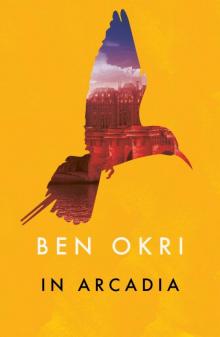 In Arcadia
In Arcadia